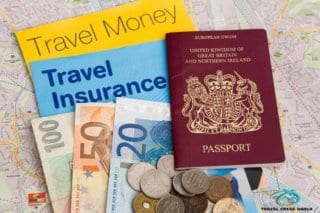
What Are the Best International Credit Cards for Expats?
 Most people living abroad agree that debit and credit cards make life easier, and rewards points on credit cards can only sweeten the deal. However, for expats, these cards can be your best friend or worst enemy. They can protect you from bad currency exchange rates or cost you an arm and a leg in fees.
Most people living abroad agree that debit and credit cards make life easier, and rewards points on credit cards can only sweeten the deal. However, for expats, these cards can be your best friend or worst enemy. They can protect you from bad currency exchange rates or cost you an arm and a leg in fees.
To help you prepare for your move, we've researched the best international credit cards for living abroad and answered some common questions about using them overseas.
Most people living abroad agree that debit and credit cards make life easier, and rewards points on credit cards can only sweeten the deal. However, for expats, these cards can be your best friend or worst enemy. They can protect you from bad currency exchange rates or cost you an arm and a leg in fees.
To help you prepare for your move, we've researched the best international credit cards for living abroad and answered some common questions about using them overseas.
Will My Card Be Accepted in Most Countries?
Credit and debit card acceptance can vary depending on the country you are traveling to. In developing countries, cash is often the preferred payment method. However, many smaller vendors in developed nations also accept cards, especially contactless payments. Therefore, before moving, make sure you confirm the types of payment that are accepted in your destination country.
You may discover that some countries don't have ATMs, or if they do, they may not accept international cards. Even if credit and debit cards are commonly used, keeping some cash on hand is always a good idea. Doing the research in advance will help you determine how much money to bring and whether you will need to make multiple trips to the ATM.
What Are the Best Credit Cards to Use While Living Abroad?
The "best" credit card will vary based on your individual needs. However, here are some highly recommended credit cards for expats:
Capital One Venture Rewards Credit Card
- No foreign transaction fees
- Earn $400 in travel credit if you spend $3,000 in the first 90 days
- $59 annual fee after the first year
- Earn 2 points for every dollar you spend
Bank of America Travel Rewards Credit Card
- No foreign transaction fees
- No annual fees
- Earn $200 in travel credits if you make $1,000 in purchases within the first 90 days
- Earn 1.5 points for every dollar you spend
Chase Sapphire Preferred
- No foreign transaction fees
- Earn $625 in travel credits if you spend $4,000 in the first 90 days
- $95 annual fee after the first year
- Earn 2 points for every dollar you spend on restaurants and travel
For a more detailed list of the best credit cards for living abroad, explore the following articles:
What Is the Typical Processing Fee for International Credit and Debit Cards?
Processing fees can vary significantly from one card to the next. However, certain companies will charge much higher fees than others. For example, Capital One and Discover are well-known for not charging foreign transaction fees on certain cards, while banks like TD Bank and Wells Fargo may charge up to 3% on certain credit and debit cards.
These fees can differ based on the card product rather than the bank itself. Many banks waive foreign transaction fees for selected cards, so it’s essential to research the terms and costs associated with your specific cards before moving abroad.

In some cases, opening a local bank account and using a local ATM or credit card may be more beneficial. That way, you can transfer money to your new account and manage your finances more easily while reducing foreign transaction fees. To open a local bank account, you may need documents such as proof of residency, identification, and a local tax identification number.
There are several ways to transfer money internationally; depending on the amount, a wire transfer may be the best option. You might also want to consider getting a local credit card, which may have better acceptance, lower fees, and rewards for local purchases.
Lastly, be aware of currency conversion fees and dynamic currency conversion (DCC) at payment terminals, which can lead to poor exchange rates. It's generally best to decline DCC.
Read More: The Ultimate Moving Abroad Checklist
What Do I Need to Do Before Using My Debit or Credit Card Abroad?
Here are a few things to do before moving overseas and using your debit or credit card:
Request Your Credit Card's PIN Number
Contact your credit card company to request your PIN number. In the U.S., signing for purchases usually works, but many merchants in Europe require a PIN for chip-enabled transactions. Some may still accept signatures or contactless payments for smaller amounts.
Inform Your Bank of Your Move
Banks and credit card companies monitor for fraud and may freeze your card if they suspect unusual activity. One major red flag is international purchases, so contact your bank before moving to add your host country to their records. Although frozen cards can often be resolved quickly, you don’t want to be unable to pay your restaurant bill!
Check Foreign Transaction Fees On Your Card
Before moving abroad, look up the foreign transaction fees for any credit or debit cards you plan to use. It’s best for expats to have accounts with banks or credit card companies that charge minimal fees. Some banks may charge a flat rate for ATM withdrawals, while others charge a percentage. Understanding these fees can significantly impact your finances abroad.
What If My Credit Card Doesn't Have the Chip?
If you’ve spent time in Europe, you may have noticed that Europeans insert their cards into credit card processing machines instead of swiping them. This is because European cards include a chip, a security feature that helps reduce fraud.
While many new U.S. credit cards now include this feature, it is still not the norm. Fortunately, European processing machines will usually still accept cards without chips.
If you plan to use your credit or debit card overseas, ask yourself:
- What are the ATM and point-of-sale fees for my debit or credit card?
- How does my card determine the exchange rate? Do they add a surcharge?
- Is my card widely accepted in the country I will be traveling to?
- Are there local banks with no or lower fees?
It’s wise to carry one credit card and one debit card from different banks as a backup in case of issues when you arrive overseas. Storing cards in various places is also smart in case one gets lost or stolen.
What If My Card is Lost or Stolen?
Knowing your credit card's emergency assistance services can be crucial if you lose your wallet or face theft. Many credit cards offer emergency cash advances and replacement services, ensuring that you have access to funds even in dire situations. Familiarize yourself with the process for reporting lost or stolen cards and how quickly you can get a replacement.

You might also want to consider buying travel insurance that covers credit card fraud and lost or stolen cards. Some credit cards also offer purchase protection, extended warranties, or price protection, which can be helpful while traveling.
Final Tips for Secure Credit Card Use
Before you pack your bags for your adventure, keep these final tips in mind for a smooth credit card experience while traveling:
Inform Your Bank
Let your bank know about your travel plans before you leave so they know you will be using your debit or credit card overseas. This can prevent your card from being frozen due to unusual spending patterns.
Enable Security Features
Turn on alerts for international transactions to monitor your account for suspicious activity and detect potential fraud early.
Monitor Your Accounts Regularly
Keep an eye on your bank and credit card statements while abroad. Regularly checking your accounts can help you spot any unauthorized transactions early on and resolve issues quickly.
Use Contactless Payment Methods
Many countries are moving toward contactless payment systems. For added safety and convenience, consider using digital wallets or mobile payment apps linked to your bank account or credit card.
Understand Cultural Payment Preferences
Learn about the payment preferences in your destination country. Cash may be preferred in some areas, even if cards are accepted. Researching local customs can help you avoid awkward situations when paying.
Learn from Other Travelers' Experiences
Listening to other expats and travelers can provide valuable insights. Many share their experiences regarding card acceptance and fees. For example, U.S. credit cards often work well in large cities but may not be accepted in smaller towns. Keep some local cash on hand as a backup.
By following these guidelines, you can use your credit card more effectively and safely while living abroad.



